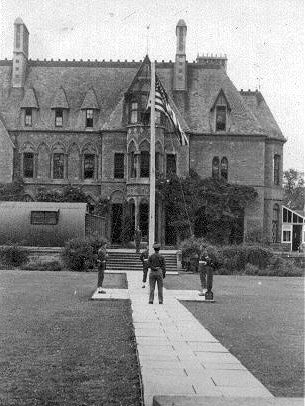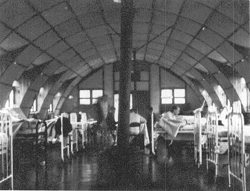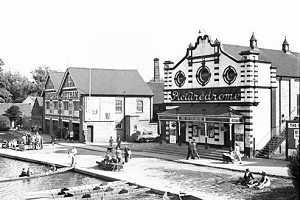
|
MILTON ERNEST HALL 1943-45 (Parts One and Two) Part Two. Photos and captions |
Part One
written by Bob Seymour.
Captain. VIII Air Force Service Command (Communication Section).
I arrived at Milton Ernest in late '43 or early '44 after service at our airbase at Polebrook, near Oundle, near Peterborough, and HQ Eighth Air Force in High Wycombe. My job was to supervise procurement, service and maintenance of radio countermeasure and navigation equipment for the Air Force, and make sure that all groups had plenty of chaff on hand (stuff like gum wrappers we dropped to confuse AA direction-finding radar). I stayed until fall of '45 and went back to High Wycombe.
Field officers (Majors and above) stayed in the "castle" (we called it) and company officers (Capts, Lts and a few Majors) lived in the Nissen huts set up around the grounds. My guess is that we had about 40 officers and 80 or
so other ranks, including a few liaison officers from the RAF. It was not a big place, and actually quite pleasant.
People often talk about Glenn Miller in connection with his time in Bedford. We saw him quite often, they came out to get paid (we were the nearest base with facilites to handle payroll) to play softball, organize a long-running poker game. A few times a group from the band (8 or 10) came out to play for dancing and we'd invite local girls from Bedford and Cambridge.
But aside from those times we worked hard and did a good job. We kept them flying.
In the early spring of 1945 I was working in Communications Section of VIII Air Force Service Command Headquarters in a little English village called Milton Ernest. We were on the banks of the Ouse River about ten miles north of the county town of Bedford. It was about the most pleasant place to be during wartime that one can imagine. Our offices and the living quarters for most of us were in Nissen huts clustered about a big house in the middle of the estate property we called "the Castle." Actually, it was probably a typical large Victorian house of a prosperous country squire. The Royal Air Force, who were, in some ways, our hosts, provided us with waitresses for the dining room, and, in my hut, at any rate, an elderly ex-soldier called "MC" who cleaned up, kept the stove going, while his wife did our laundry.
I was glad to be there for the work was interesting - my job was to expedite radio counter-
measure and radar navigation equipment from the U.S. into our planes, and to make sure that each group had plenty of "chaff" (aluminum foil strips, like gum wrappers, which we tossed out of our bombers to confuse the German anti-aircraft radar). Despite several highly touted electronic jamming equipments we'd tried, chaff worked about as well as anything.
I'd spent some time west of London at HQ, Eighth Air Force, listening to the V1 bombs coming over, and sometimes dropping nearby. One hit my favorite pub in Marlow, blew it to bits. Milton Ernest was better, for sure.
Glenn Miller and his big Air Force band made its headquarters in Bedford and frequently broadcast from there. Our little post, being the closest military establishment, was designated as the payroll location for Glenn and the band. Some of the band members would hang around our place on days off, play poker or softball. Once in awhile we'd have parties and invite the local gentry and some of the lonesome girls from Bedford or Cambridge.
Captain Miller usually obliged by bringing out a small all-star band to play for dancing, featuring such renowned sidemen as Peanuts Hucko on woodwinds.
One night Glenn goosed my hutmate's girlfriend on the dance floor resulting in a minor squabble which had to be pulled apart. Probably too much Scotch from our regular RAF ration. A hard life, indeed!
Another night, one of the guys in my hut, Major Bill Park from Ohio, was showing off his souvenir captured Walther P-38 pistol to some admiring officers gathered around. "Better be careful with that," one said. "Don't worry," Bill answered, "it's not loaded." But right then "BAM." It sure was loaded and it hit me on the left side of my abdomen.
What's it feel like? Like being socked with a baseball bat. It knocked me down. There was no pain as far as I can remember. They got me on a stretcher and in an ambulance after a while, took me to a military hospital in Diddington, about 15 miles away, and I don't remember much after that.
Next morning I woke up in a ward full of infantry guys - very young, and very seriously wounded. I could hear one say to another, "He's an Air Corps guy - the only way they can get in here is to shoot each other." He was right, too, in some ways, considering the life I'd been leading. But not really true. I'd been at 351st Bomb Group for a few months when I first arrived in England. We'd seen crippled bombers
 come back with blood all over the interior, and stood by the tower waiting for too many planes that didn't come back at all.
come back with blood all over the interior, and stood by the tower waiting for too many planes that didn't come back at all.
Ward 6, Surgical, was a new experience for me. All of us got to be good friends, and well managed by Nurses Petrat and Rebich who stood for no nonsense from anyone. The days were filled with a rough humor I'd never have expected from men - some of whom were actually not expected to live. Jack, in the bed next to me, told me some jokes one night - to cheer me up, I guess. My wound had broken open and the bed was all bloody. "Don't let it worry you," he said, "the docs are really good here."
They easily sewed me up again, a little tighter this time, but next morning Jack's bed was empty. "He didn't make it," one of the men said. We lost two more in the three weeks I spent there. But everyone acted cheerful most of the time, as sick and bruised as most of them were. There were lots of jokes about the terrible "88's" - the German cannons that seemed to have brought most of them here. When I think about it now, tough nurses Petrat and Rebich, and the spirit of many of the guys kept more of them alive than if we'd been bathed in sentimentality.

Nurse Rebich, a pleasant young woman when she wasn't scolding us, had a kitten she'd bring in once in a while, let it play with a ball of string on our beds. On an unusual warm day they'd wheel some of the beds outside so we could lie in the sun.
'The doctors thought I needed blood to replace what I'd lost and I felt really grateful that almost everyone at Milton Ernest had signed a sheet to be a donor, including Bill Park. The Colonel in charge of HQ's A-1 section (administration) came to me one day to see if I wanted to press charges against Bill, who was his deputy. Or, could they do anything special for me? I told him Bill Park was a friend, it was an accident, and I wouldn't think of pressing charges, but how about a special R & R (rest and recreation) in Italy?
I was really joking - who'd ever heard of junior officers getting that kind of treatment. I'd expected I might get a few days in Scotland if I was really lucky. But in a few weeks the orders came back ("By Command of General Eisenhower" - I liked that - air transportation to Italy authorized and military accommodation anywhere I could get to. So, in July I went to Italy, walked in the mountains, and it was almost worth getting shot.
I also took some pictures in Bedford. The Horse and Groom where weak warm beer was served and not much else. And the Picturedrome, where if you went to the men's room it was outside and you had to pee against a brick wall.

The weak warm beer was not popular. Once, when we had obtained a good supply of Scotch whisky, we heard that the Navy had beer, so we sent a truck down to Plymouth and traded a couple of cases of Scotch for a truckload of American beer.
Powdered eggs annoyed everyone in the UK, military and civilian. The farmers were required to turn over almost all their eggs to the government, but were allowed to keep some for use by their own families. One of our enterprising guys worked up a route of going to some of the farms in the neighborhood on his bicycle and buying one egg from each one. In his weekly trip he would usually get a dozen eggs at something like 3p each. When he got transferred I took over his route for a few weeks. While high-ranking officers were having powdered eggs or SOS, I had the cook fry me up a couple of eggs. Caused quite a stir. I should explain SOS. It stands for, to put it indelicately, shit-on-shingle. Composed of left-over ground-up hamburger covered with some dreadful white sauce and served on a soggy piece of toast. Some people actually liked it.
When I arrived at HQ Eighth Air Force as an unemployed 2nd Lt in early 1943 they put me to work as a top-secret courier. It seems that the strike orders from the HQ operations section were teletyped to the various divisions late in the afternoon, giving instructions on what to bomb and what route to take. But for some reason it was required that the instructions also be delivered in person, and a signed receipt obtained. And that's what I had to do, strap on a 44 Colt and set off with a driver in the middle of the night to go from High Wycombe up into East Anglia to wake up the commanders and get a signature. With an experienced driver it was not too bad, but with a new driver it was an all-night chore. All the signposts in the UK were removed early in the war to confuse the Germans if they ever came. And the blackout was strict, only a tiny slit of light was allowed on our jeep's headlights. And that's where Newnes Motorists Touring Maps were our salvation in getting to places like Alconbury, or Abbots Ripton, or Honington.
Some of our enlisted men had struck up relationships with girls in Olney, so every
Saturday night we sent over a truck with about 7 or 8 men for visits with their girls. But an officer was required to go along. We rotated this duty. When my turn came the men dispersed to wherever and I sat in the pub with the weak beer and wrote long letters to my
wife. Olney is the place where they have a pancake race every year. It became paired with Liberty, Kansas, where a similar race takes place.
While I saw quite a few V1 bombers in London and even as far out as High Wycombe. We never saw anything in Milton Ernest. I think the nearest was that the first V2 landed in Luton.
back to top